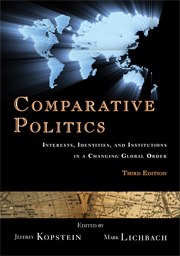Book contents
- Frontmatter
- Contents
- List of Maps
- Preface to the Third Edition
- List of Contributors
- 1 What Is Comparative Politics?
- 2 The Framework of Analysis
- PART ONE EARLY DEVELOPERS
- PART TWO MIDDLE DEVELOPERS
- 5 Germany
- 6 Japan
- STOP AND COMPARE
- PART THREE LATE DEVELOPERS
- PART FOUR EXPERIMENTAL DEVELOPERS
- Index
- References
5 - Germany
from PART TWO - MIDDLE DEVELOPERS
- Frontmatter
- Contents
- List of Maps
- Preface to the Third Edition
- List of Contributors
- 1 What Is Comparative Politics?
- 2 The Framework of Analysis
- PART ONE EARLY DEVELOPERS
- PART TWO MIDDLE DEVELOPERS
- 5 Germany
- 6 Japan
- STOP AND COMPARE
- PART THREE LATE DEVELOPERS
- PART FOUR EXPERIMENTAL DEVELOPERS
- Index
- References
Summary
Introduction
In October 1990, the East German state (the German Democratic Republic – GDR) collapsed and its territory and people were absorbed by the West German state (the Federal Republic of Germany – FRG), even though just over a year earlier almost no one had expected this to happen. Yet, the strange fate of East Germany makes sense as part of Germany's path through the modern world, which has been influenced strongly by external political and economic challenges. A precarious military-strategic position in Europe made it difficult for one German polity to rule over everyone who is in one way or another conceivably German; German political organizations frequently competed with one another for people and territory. Only rarely did one kingdom, empire, or state succeed in dominating all other German polities. Even today, millions of German-speaking people and considerable territories that were formerly governed by various German rulers remain outside of the unified German state.
The challenges that Germans faced and their responses were characteristic of what happens when a major power takes a middle path through political and economic development. Germany was at a disadvantage with respect to the early developers. In politics, German rulers could not match France in establishing strong central authority over a vast territory. In economics, German industrial development lagged behind Britain's. Along with these strategic and economic disadvantages, however, the rapid diffusion of new ideas into Germany offered certain opportunities.
- Type
- Chapter
- Information
- Comparative PoliticsInterests, Identities, and Institutions in a Changing Global Order, pp. 140 - 179Publisher: Cambridge University PressPrint publication year: 2008



